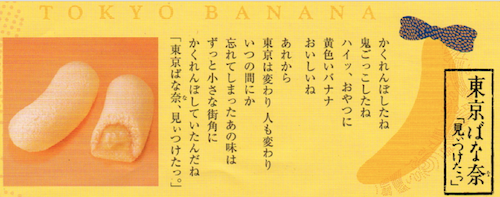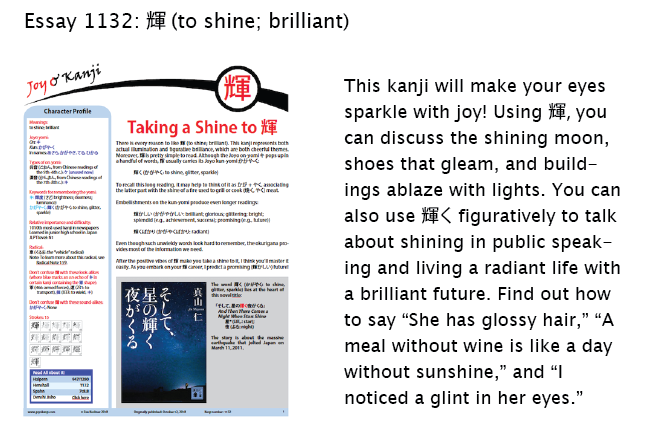Tokyo Banana and a Matcha Madeleine
Last month I posted here about a Tokyo Banana KitKat that my husband's colleague gave me. One thing led to another and he next brought me a Twinkie-like "Tokyo Banana" snack. As usual, the best part was the kanji on the package insert:

Here's what it says, along with translations, vocabulary, and some notes:
かくれんぼしたね
You played hide-and-seek
かくれんぼ* (隠れんぼ: hide-and-seek)
鬼ごっこしたね
you played tag
鬼ごっこ (おにごっこ: game of tag)
ハイッ、おやつに
here you are, for your snack
おやつ (お八つ: snack)
黄色いバナナ
yellow bananas
黄色い (きいろい: yellow)
* Whereas 黄色 (きいろ) is “yellow” as a noun, 黄色い is “yellow” as an adjective.
おいしいね
so delicious
あれから
Since then
東京は変わり 人も変わり
Tokyo changed; people changed, too
東京* (とうきょう: Tokyo); 変わる* (かわる: to change); 人 (ひと: person)
いつの間にか
before you knew
いつの間にか (いつのまにか: before one knows)
忘れてしまったあの味は
the taste you forgot
忘れる (わすれる: to forget); 味 (あじ: taste)
ずっと小さな街角に
has always hidden in a small town
小さな (ちいさな: small); 街角 (まちかど: a place in town that many people pass)
* The word 街角 has two meanings: "(1) street corner; (2) a place in town that many people pass." Both work here.
かくれんぼしていたんだね
playing hide-and-seek
「東京ばな奈、見ぃつけたっ。」
Tokyo Banana, I fooound you!
ばな奈 (バナナ: banana); 見つける (みつける: to find, elongated here for emphasis)
* The last line appeared in the earlier blog, translated there as "I fooound it!" Either interpretation is possible, but in this passage it sounds as if someone were addressing Tokyo Banana.
I read this passage with the help of my language partner Kensuke, who explained it this way in Japanese: People associate bananas with something they enjoyed in childhood. Biting into this snack now will bring up old memories. The games かくれんぼ and 鬼ごっこ represent childhood, and those are the sorts of long-forgotten things that one remembers when eating a Tokyo Banana.
At least that's what I thought he was saying. I replied that this was just like Proust's eating a madeleine and being flooded with memories. I asked Kensuke if that meant anything to him. He didn't know about Proust but said that the cookie is quite popular in Japan, where it is known as a マドレーヌ. Googling that brought me to a man named Sadaharu Aoki, a pastry chef in Paris who has concocted a matcha madeleine.
All of this filled me with great excitement. I was thrilled to have understood what Kensuke told me in Japanese. I was excited that Googling a European cookie brought me back to something Japanese. And I was even more stoked when I searched Amazon Japan for images featuring 寂 (lonely; desolate; quiet) for essay 1345 (which comes out on October 19) and found a book with 隠れんぼ in the title! I recognized and understood that word right away!
Here's the title, in case you're curious:
「閑寂隠れんぼう 埋まった気持ちたち」
A Peaceful Game of Tag: A Plethora of Buried Feelings
閑寂 (かんじゃく: quiet; peaceful); 埋まる (うまる: to be buried);
気持ち (きもち: feelings); -たち (pluralizing suffix)
Ooh, if the title is any indication, the book is about psychological repression and a game of tag that seemingly causes the buried content to surface! This is just the sort of thing that interests me.
I'm also intrigued by the apparent chain of events: Eating Tokyo Banana causes memories of tag to surface. In turn, a game of tag unearths emotions that you've stuffed inside and forgotten. What comes next?!
I then checked with my proofreaader Lutlam about the Tokyo Banana insert and didn't tell him the explanation I'd heard. I wanted to see what he'd say about the text.
Here's what I received: "The general idea of this passage is, Tokyo Banana has been playing かくれんぼ (hide-and-seek) with its 'forgotten taste' while Tokyo and its people significantly changed, and Tokyo Banana's taste has finally been found again. Hence, 見ぃつけたっ (I fooound you)." He added that 鬼ごっこ has a big thematic overlap with かくれんぼ, as both include hiding and chasing, but said that 鬼ごっこ isn't very important in this context.
I was distraught. All that elation for nothing? I had tracked down Proust and Aoki, traveling to France (in a sense) twice over ... for nothing! And my listening comprehension had failed me yet again. Sigh.
Still, I thought it was worth checking the earlier interpretation with Lutlam, so I did, expecting the worst. Another surprise! He said, "I believe Kensuke's interpretation is possible."
Aha! Tokyo Banana inserts are apparently like poetry, where the meaning is in the eye of the beholder!
My sense of hopelessness disappeared. And I realized this: Proust may have needed to eat a madeleine to make his thoughts overflow, but I didn't need the Tokyo Banana treat for that. Instead, I needed the throwaway paper that came with it! One man's trash is another's treasure, as people kind of say!
If any of this felt illuminating, I think you'll take a shine to the newest essay:
Catch you back here next time!
❖❖❖
Did you like this post? Express your love by supporting Joy o' Kanji on Patreon:



Comments